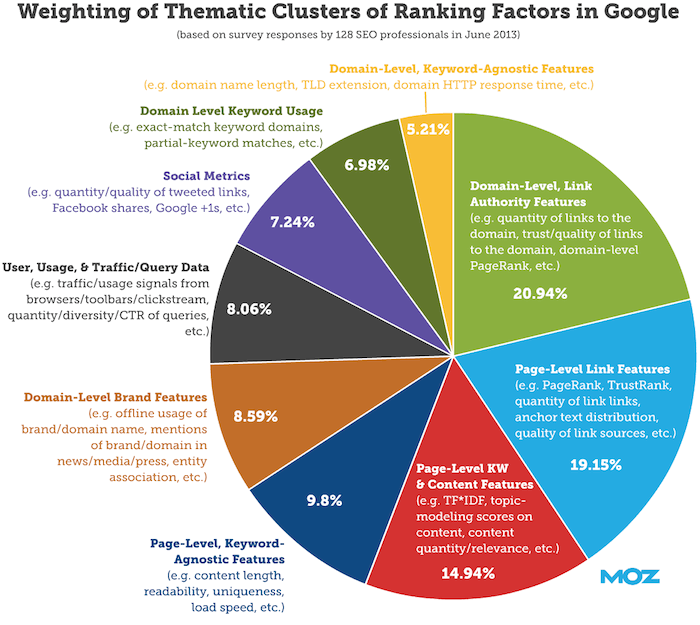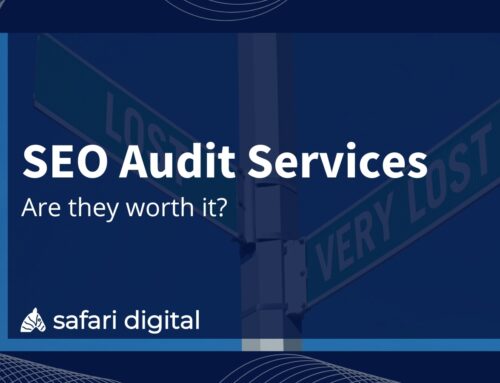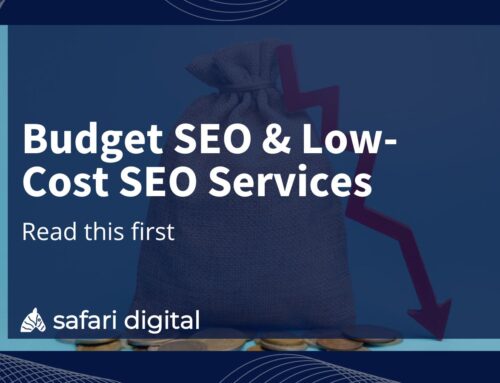Search Engine Optimisation (SEO) is a process that affects the visibility and ranking of a website on search engine results pages (SERPs). SEO is designed to increase the volume of inbound traffic or the number of visitors to a website by promoting the awareness of the webpage among online users by elevating it search engine ranking.
All of the major search engines including Google, Bing, Yahoo and Baidu have a primary search results page. The ranking of these search results pages is based on what search engines consider to be the most relevant to users. As opposed to paid ads which feature a subtle ‘ad’ disclaimer, appearing at the top of organic search engine results cannot be purchased.
Google does not release an SEO Guide that explains how to perform best practice SEO for one very simple reason. In 2017, the bulk of Google’s $110.8 billion revenue came from its proprietary advertising service, Google AdWords.
It’s in the best interest of Google to make SEO as difficult as possible so that users will default to their paid revenue system of AdWords.
As of 2019, Google uses more than 200 ranking factors in their algorithm to determine the order in which results are shown. Generally speaking, these can be broken into two key categories. On-page ranking factors – these include optimisation which is performed on your website to improve organic search rankings. And off-page SEO which includes things which happen off your website that will impact the way that your site appears in organic results pages.
SEO Ranking Factors
For a comprehensive, yet digestible, look at how SEO influences organic rankings, Brain Dean at Backlinkio does a good job of breaking down Google’s top 200 ranking factors. Google’s ranking factors can be sorted into 9 key categories.
Domain Level Factors: Unlike many other of Google’s 200 ranking factors, the domain level factors are much more difficult to control. Domain level factors relate to the name of domain (keyword match), history of the domain (was this domain name previously associated with spam activity), and the owner of the website.
Page Level Factors: This is everything that you do on page to optimise for the search engines. On-page SEO relates to the way that keywords are used, meta data is optimised, content length, page load speed, duplicate content, internal linking, and many more technical factors. On-page SEO is the foundation of any successful optimisation campaign.
Site Level Factors: Site level factors are among the most important ranking factors in the Google Algorithm. An effective SEO campaign will address site level factors such as Site Architecture, Sitemap, SSL Certificate (now considered a ranking factor), privacy pages, navigation structure and important information pages.
Backlink Factors: Backlinks are incoming links from other websites and are perhaps the most important ranking factor in 2019. Google views Backlinks as a vote of confidence from other websites. The more authoritative the website pointing to yours is, the more valuable that link will be. Similarly, links coming from spam sites can harm your rankings – these can also be addressed and amended.
User Interaction: The way that users interact with your website is an important ranking signal in determining its value. For instance, if users are visiting your website and leaving immediately – Google will interpret this as your site providing little or no value. Conversely, sites which have a high CTR (click through rate), low bounce rate, and a high number of repeat visitors are viewed to be valuable by Google. Always remember that Google’s core mission is to provide value to their users. If your website is interfering with their ability to deliver quality content to the end user, they will rank you accordingly.
Special Google Algorithm Rules: As the name would suggest, these are a specific set of rules that will affect how results are delivered to users. Things like location (where the user is located), user search history, freshness of content, and user browser history can all impact the way that individual search results are generated.
Brand Signals: Did you know that creating a ‘brand identity’ for your business can help your search engine results? Google uses branded searches (i.e. Your brand name + products you sell) as a ranking factor. If users are searching for specific keywords attached to your brand, it makes sense that those keywords (sans brand) will receive a ranking boost.
On-Site Webspam Factors: Sites with low quality content (content farms, PBNs and thin-content spam sites) are being penalised by Google. There are obvious factors such as popups, poor UX, sneaky redirects and low-quality content that are obvious things that should be avoided. Less obvious on-site webspam factors include over-optimising. Yes, you can go too far with SEO! Google’s core belief is that websites should provide value to the user, if your website has been optimised to the point of being complete gibberish (think: keyword stuffing), then Google will penalise you.
Off-Site Webspam Factors: Offsite webspam factors are difficult to predict and can be even more difficult to fix. If you’ve worked with an SEO agency in the past who was built irrelevant, unnatural or low-quality links to your website then chances are you’re still dealing with the consequences. Google’s Penguin update cracked down on webmasters who used unscrupulous techniques to game the algorithm. An experienced SEO professional will be able to rectify these issues and get your website back on track.
It’s important to remember that all 200+ of Google ranking factors work in combination to provide a search engine ranking. Doing one aspect of SEO very well will not guarantee success. Having lots of links won’t help if they are all low quality. Similarly, having lots of content will not help if it is all low quality. SEO is constantly evolving, many of the techniques that worked 5 years ago are now irrelevant.

Types of SEO
Most SEO tactics will fall into one of two very distinct categories. Those that abide by Google’s Webmaster Guidelines (white hat SEO) and those that aim to exploit them for short term gain (black hat SEO).
White hat SEO techniques are those that adhere to the best practices and guidelines of search engines – not just Google search. White hat SEO is implemented with the end user in mind. Keeping in line with Google’s core value of delivering a good experience for their users, websites that use white hat SEO techniques aim to deliver the best possible user experience without manipulating them into visiting their website.
White hat techniques focus on delivering valuable, relevant content. White hat SEO is a long-term tactic, but when done correctly, the results delivered can be transformative.
Black hat SEO techniques, by nature, attempt to ‘outsmart the algorithm’ by creating content and links that mislead the user into visiting a webpage.
Black hat SEO is designed to improve the site ranking through the use of deceptive methods bypass the rules. Black hat SEO techniques such as keyword stuffing, buying links, unnatural link schemes, invisible text, and page swapping (illegitimate redirects), can result in a website being penalised and, in some cases, completely banned.
Recent algorithm updates such as Google’s Panda update have made it increasingly difficult for shady SEO tactics to deliver the immediate growth that they once generated.
Google updates it’s algorithm more than 500 times per year in order to maintain a well-balanced and up to date search experience.
Find A Search Engine Optimisation Expert
Search engine optimisation can be daunting for new (and experienced) website and business owners. There are countless guides, tools and online information that are worth reading in order to gain a base-level understanding of how SEO can impact your business. Understanding and implementing effective SEO is not rocket science, but it does require a lot of time, effort and commitment.
Depending on the goals and scale of the website, webmasters can always hire an SEO professional, SEO consultant or dedicated SEO agency to help them develop and implement an SEO strategy. SEO isn’t set and forget, it requires constant work and upkeep. The higher you get in the search engine results, the more of a target you become for your competitor.
Safari Digital is a dedicated SEO agency that works with small to medium businesses to improve the quantity and quality of leads that businesses generate through organic traffic. As a team of dedicated SEO professionals, we focus exclusively on SEO which means that we’re constantly reviewing and implementing new strategies to improve organic traffic for businesses in Australia and around the world.






